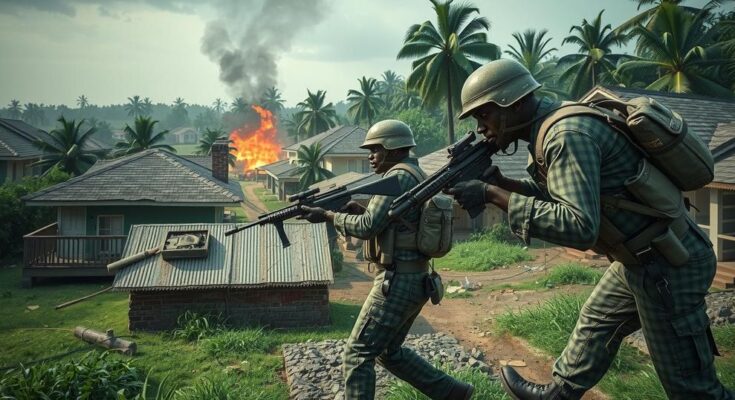Rwanda-supported rebels have captured Masisi, a key town in eastern DR Congo, marking their second takeover in two days in a region plagued by ongoing conflict. This escalation brings attention to the humanitarian crisis in North Kivu province and the broader implications of regional tensions involving Rwanda.
Rebels reportedly supported by Rwanda have overtaken the town of Masisi in eastern Democratic Republic of Congo, marking the second town seized by the M23 group in two days. This development is part of a broader trend, as the M23 has gained control over significant portions of eastern DR Congo since 2021, displacing hundreds of thousands of residents. In light of this development, Angola has attempted to mediate discussions between Congolese President Félix Tshisekedi and Rwandan President Paul Kagame, although negotiations collapsed last month. Alexis Bahunga, a member of the North Kivu provincial assembly, expressed alarm regarding the situation, stating that the seizure of Masisi exacerbates a severe humanitarian crisis and called for an enhancement of military capacity in the area.
One local resident recounted how M23 representatives convened a meeting, declaring their intent to “liberate the country.” While the Congolese government has yet to respond officially to the town’s capture, Masisi, which has approximately 40,000 inhabitants, serves as the capital of its own territory. This town is situated about 80 kilometers north of Goma, the provincial capital that M23 briefly occupied in 2012. The group had also seized the nearby town of Katale, heightening fears that Goma may once again be threatened.
Last year, concerns arose regarding the potential resurgence of violence by the M23, but a respite occurred until December when hostilities resumed. Notably, in July, Rwanda did not deny allegations from a United Nations report indicating the presence of around 4,000 Rwandan troops aligned with the M23, claiming that the Congolese government has not adequately addressed long-standing conflicts in the eastern region. Moreover, Rwanda has previously accused Congolese authorities of collaborating with individuals implicated in the 1994 Rwandan genocide against Tutsis and moderate Hutus.
The M23 emerged from another rebel faction in 2012, with the professed aim of protecting the Tutsi community in eastern DR Congo. However, critics assert that Rwanda exploits the M23’s activities to extract valuable minerals such as gold, cobalt, and tantalum, which are utilized in the production of mobile phones and electric vehicle batteries. In a related development, DR Congo recently announced legal action against Apple concerning the use of “blood minerals,” which prompted the tech company to disclose its cessation of supply acquisitions from the country.
The conflict involving the M23 and its connections to Rwanda stems from longstanding ethnic tensions in the eastern Democratic Republic of Congo, particularly concerning the treatment of Tutsis. The region has been marked by violence and instability for decades. The M23, initially formed as a response to perceived discrimination against the Tutsi population, has since evolved into a powerful force, which critics allege operates with Rwandan military support to mobilize resources and control territory.
The seizure of Masisi by Rwanda-backed rebels represents a significant escalation in the ongoing conflict in eastern DR Congo, which has led to substantial humanitarian distress. The M23’s actions highlight persistent regional instability and the intertwined interests of neighboring countries. As the situation continues to develop, there are growing calls for increased military support for the Congolese authorities and renewed efforts to mediate the conflict by international actors. The use of conflict minerals remains a critical issue, underscoring the complexity of the conflict and its global ramifications.
Original Source: www.bbc.com




